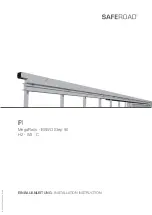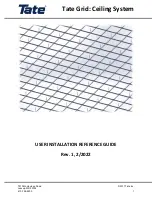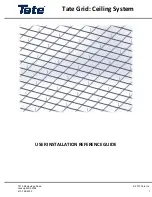
DURAFLO™ 18 GPM PUMPING STATIONS
20
Belanger, Inc.® * PO BOX 5470 * Northville, MI 48167-5470 * Ph (248) 349-7010 * Fax (248) 380-9681
1MANUL375
Maintenance
Powder Coating Repair
Repair, fading, blemishes and light scratches, to powder coating.
Repair faded powder coating
Faded powder coating means, the surface of the coating has oxidized. This is usually only the surface (2-3 microns).
By rubbing with cutting compound the oxidized surface will be removed and new paint exposed with its original color.
However, if the original coating was a matte finish it will now have been polished to a gloss.
Repair light scratches and blemishes to powder coating.
Scratches may be deeper than 2-3 microns. Use cutting compound to remove the powder coating down to the level at
the bottom of the scratch. A fine rubbing down paper may speed up the process (800 to 400 grit, no coarser), but the
job will need to be finished with cutting compound to remove the fine scratches left by the rubbing down paper.
Repair Powder Aerosol
Cleaning prior to painting.
The original paint needs to be clean prior to ‘touch up, or touching in’ repainting. Indoor components may have been
polished with polishes containing Silicone. Silicone will repel any further painting and must be removed from the local
area. Clean the surface by washing it with a detergent and a non scratch scrub sponge. Use a solution of warm water
and non-abrasive, pH neutral (pH 5 -8) detergent to clean material prior to painting. Thoroughly rinse and dry the
surface. If solvents are needed to remove marks, a soft cloth dampened with Isopropyl Alcohol may be used. Solvents
containing esters, ketones, or chlorinated solvents must not be used without consulting the paint manufacturer, as
these are too aggressive and will melt the paint. A small discrete area should be tested first.
Repair Powder
The surface contaminants may need to be removed by abrading with fine rubbing down paper ‘400 grit’. If the
component has been damaged, causing chipping or cutting to the paint, the loose flakes should be removed. ‘Ugly
steps’ where the paint has been chipped need to be feathered. Coarse rubbing down paper ’80 grit’ will do this faster,
but it will leave noticeable scratches. Finer paper will produce better results, 250 grit paper is a good compromise, (this
will wear smooth quickly, so replace it frequently).
Primer preparation
When the original paint edges have been rubbed down smooth and a step is not noticeable, remove the dust, apply a
light coat of paint/primer, and allow it to dry. This will show how well the area has been prepared. Continue rubbing
down and applying light coats, until the edges of the damaged paint have disappeared. Applied properly, at this stage
all physical signs of repair can be lost.
















































